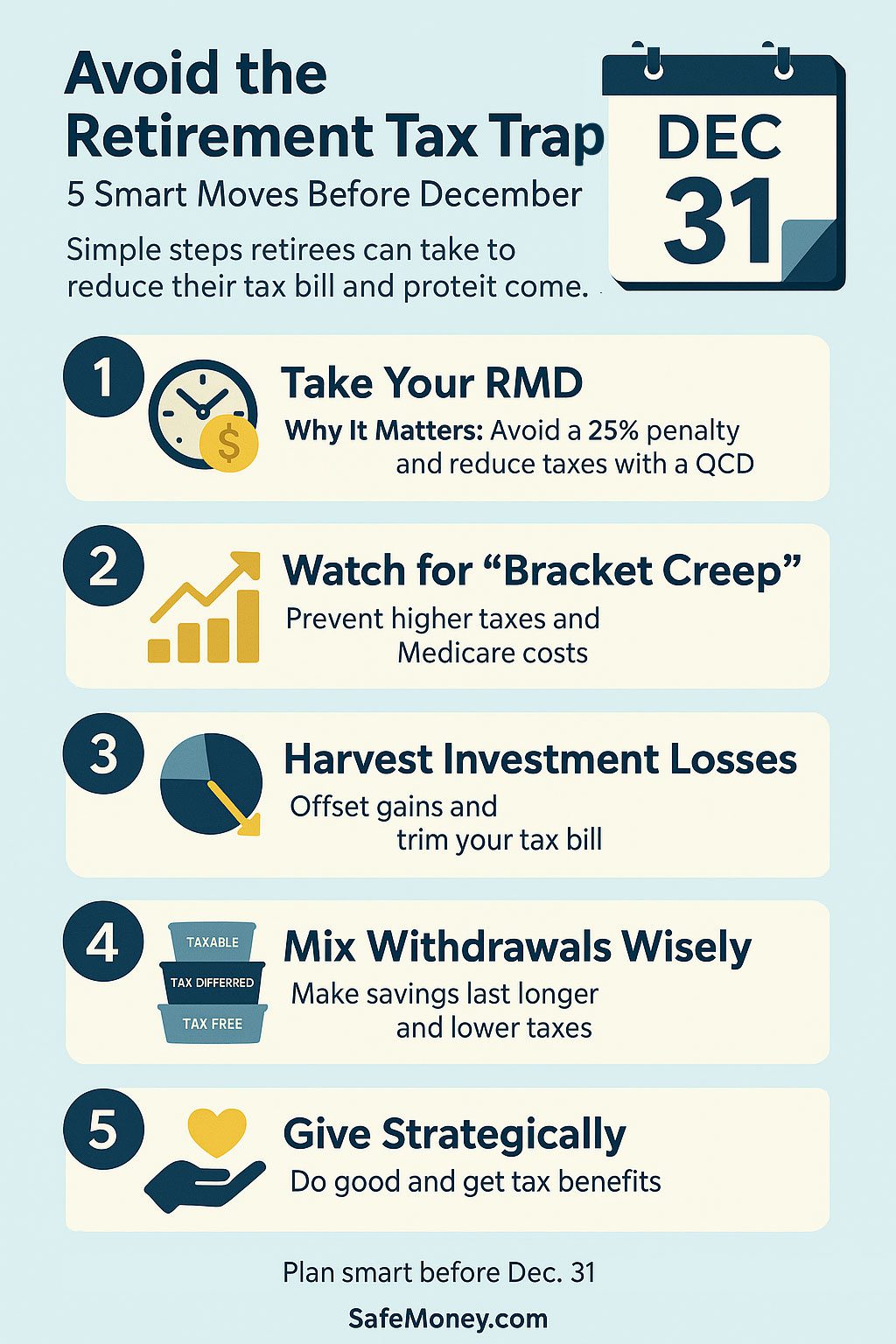The Retirement Tax Trap: Moves to Make Before Year-End

The Hidden Tax Surprise That Catches Many Retirees
You worked hard, saved diligently, and finally reached retirement. The last thing you expect now is a surprise bill from the IRS. Yet many retirees discover too late that retirement isn’t a tax-free zone. In fact, it’s easy to fall into what some call “the retirement tax trap.”
That trap happens when your Social Security benefits, pension income, and withdrawals from savings combine to push you into a higher tax bracket than you expected. The result? You keep less of your hard-earned money.
The good news is that before the year ends, there are smart steps you can take to protect yourself — and possibly save thousands.
1. Don’t Miss Your Required Minimum Distributions (RMDs)
If you’re age 73 or older, the IRS requires you to take a certain amount out of your traditional IRA or 401(k) every year. That’s called a Required Minimum Distribution (RMD).
Missing it can lead to a penalty of 25 percent of the amount you should have withdrawn — one of the steepest penalties in the tax code.
A smart move: If you don’t need the income, you can give part or all of your RMD directly to charity. This is called a Qualified Charitable Distribution (QCD). It counts toward your RMD but isn’t added to your taxable income. You help a cause you care about and save on taxes at the same time.
2. Watch Out for “Bracket Creep”
Even a small amount of extra income can have a big impact. For example, taking extra withdrawals for holiday travel or home improvements could cause more of your Social Security benefits to become taxable — or raise your Medicare premiums for the following year.
Before you make any large withdrawals, check how they affect your overall income for 2025. Sometimes it’s better to spread withdrawals over two years or wait until January to avoid moving into a higher bracket.
3. Use Investment Losses to Offset Gains
If you sold stocks or mutual funds that made money this year, you might owe capital gains taxes. But you can reduce what you owe by selling other investments that went down in value — a strategy called tax-loss harvesting.
Those losses can offset your gains dollar-for-dollar. If your losses exceed your gains, you can even deduct up to $3,000 from your regular income.
It’s a way to turn a market downturn into a little silver lining for your tax bill.
4. Think About Which Accounts You Draw From First
Most retirees have money spread across different types of accounts:
- Traditional IRA or 401(k) (tax-deferred — you pay when you withdraw)
- Roth IRA (tax-free withdrawals)
- Taxable accounts (brokerage or savings)
The order you pull from these matters. Taking all your income from one type of account could push you into a higher tax bracket or trigger Medicare surcharges. Mixing withdrawals across different account types can help keep your taxes lower over time.
It’s like drawing water from three wells instead of one — you make your supply last longer.
5. Make Your Giving Go Further
If you’re feeling charitable this season, your generosity can also help your tax situation.
Instead of writing a check, you might:
- Donate appreciated stock. You avoid paying capital gains and still get credit for the full value of the gift.
- Bundle donations. Giving two or three years’ worth of donations at once may help you itemize deductions and save more.
- Use a donor-advised fund. You can take the deduction now and decide where the money goes later.
These options let you support your favorite causes while keeping more of your savings working for you.
6. Give Your Retirement Plan a Year-End Checkup
Think of this as your annual financial health exam. Review your income, spending, and taxes for 2025 to see if anything has changed.
Ask yourself:
- Am I on track to cover next year’s living expenses?
- Have my RMDs, Social Security, or investments changed my tax picture?
- Could small adjustments today help lower next year’s taxes?
Even a short review can reveal ways to make your money last longer and work smarter.
The Bottom Line
Taxes may be one of life’s certainties, but paying more than necessary doesn’t have to be. By acting before December 31, you can avoid penalties, reduce next year’s tax bill, and keep more of your income for the things — and people — that matter most.
A few simple moves now can protect your retirement lifestyle for years to come.
Written by Brent Meyer, founder of SafeMoney.com. With more than 20 years of experience helping families navigate retirement and legacy planning, Brent is committed to making financial education simple, clear, and trustworthy.
Disclaimer: SafeMoney.com provides financial education only. For guidance on your specific situation, consult a licensed professional.









